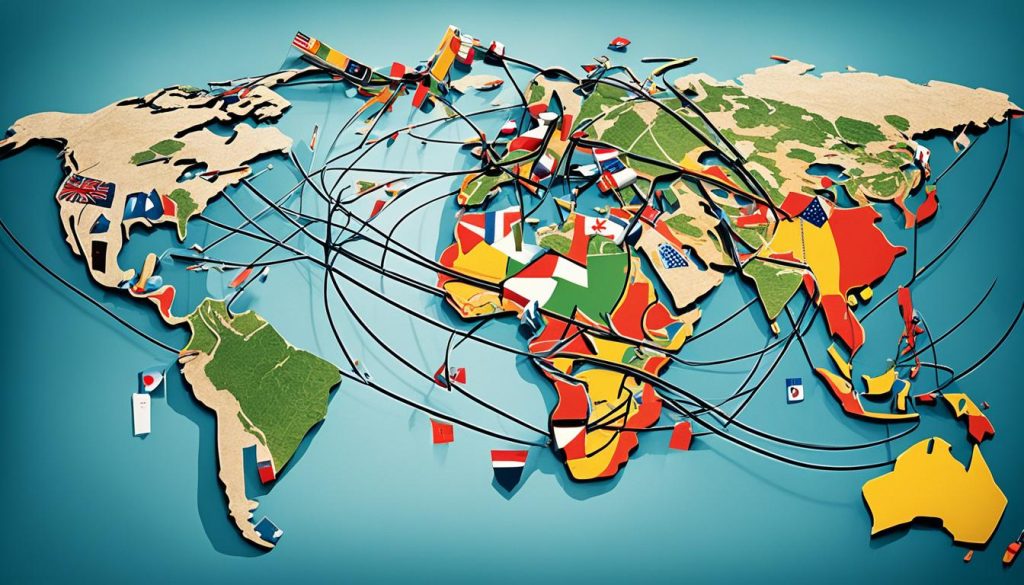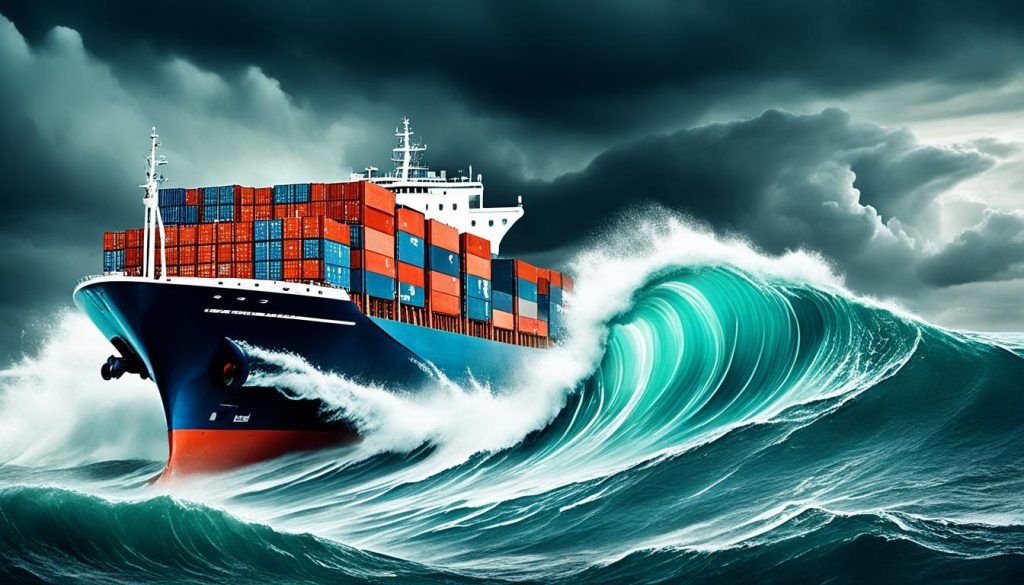Today’s businesses tackle the challenge of changing international markets. This affects how they operate worldwide. This section looks at these changes and highlights how important it is to plan strategically. With advice from Wealth Creation Specialists, we learn the value of wise investing and maintaining financial health. It’s crucial to adjust to market changes for success.
Key Takeaways
- Understanding and recognising international market volatility is crucial for global businesses.
- Strategic investment measures enable businesses to navigate economic uncertainty.
- Ensuring financial stability is key to thriving in the face of market fluctuations.
- Insights from Wealth Creation Specialists can guide effective business risk management.
- Adapting to international trade dynamics is vital for maintaining business growth.
Understanding Market Volatility
Market volatility shows how much trading prices can change over time. It tells us the speed of price changes. This helps investors understand the risks in global markets.
Definition of Volatility
In financial markets, volatility measures how much returns can differ for a given price series. A volatile market sees big price movements. This means there’s a lot of economic ups and downs. High volatility brings more risk to traders and investors, which is key for making financial decisions.
Factors Contributing to Volatility
Many things affect market volatility:
- Monetary Policy Changes: Changes in interest rates by central banks can make markets move a lot. This affects investor confidence.
- Economic Reports: Data like GDP, job rates, and inflation can shape global markets. They can start volatility.
- Global Political Events: Political troubles or wars can cause sudden economic changes.
- Shifts in Supply and Demand: Changes in what people want or supply issues can change trading prices a lot.
The Impact of Geopolitical Events on International Business

Geopolitical events deeply affect global market trends, touching many international business areas. Issues like trade wars, economic sanctions, and political disorder can shake international trade agreements. It’s vital for businesses to keep an eye on politics and make detailed risk checks to overcome these hurdles.
Political Instability
Worldwide political instability can hit international businesses hard. This could be because of government changes, unrest, or new policies. Such instability often brings economic risks and upsets the market. Firms involved in global trading need to quickly adjust their geopolitical tactics to these changes.
Trade Wars and Tariffs
Trade wars and tariffs are key issues businesses face due to geopolitical events. These issues can raise costs and mess up supply chains. A detailed political risk check lets businesses predict and lessen these risks. Understanding trade agreements is crucial for companies to deal with sanctions and stay strong globally.
Economic Indicators and Their Role
Understanding the world’s economic indicators is key to analyzing global market health. These insights help form business plans and predict market trends. Things like inflation rates and job data are vital as they affect how businesses perform and plan.
Inflation Rates
Inflation rates tell us how economies worldwide are doing. Leaders in business watch these numbers to grasp how inflation affects spending, costs, and prices. Knowing the trend in inflation lets businesses stay financially stable and competitive.
Employment Data
Job stats are crucial for understanding economic health. When more people have jobs, they spend more, which helps businesses grow. If unemployment rises, it may mean the economy is struggling. Smart businesses use this data to forecast market needs and tailor their strategies.
Diversification as a Risk Management Tool

Diversifying investments is key in the international business world. It involves spreading funds across different asset types, sectors, and places. This strategy helps protect against potential losses in any one area.
Doing so creates a stronger, more stable portfolio. It lessens the blow from market ups and downs.
Geographic Diversification
Investing in various countries and regions is known as geographic diversification. This tactic takes advantage of growth chances elsewhere. It also lowers the risk of losing money due to problems in one’s own country.
By entering global markets, companies reach more customers. They also enter fast-growing markets, boosting potential earnings.
Sector Diversification
Sector diversification means spreading investments across different industries. By investing in areas like tech, health, and consumer goods, dependence on one sector decreases. This makes the overall investment more stable.
This strategy prevents major losses if one industry faces challenges. It helps ensure the financial health of a business over time.
In short, mixing investment locations and sectors is crucial for reducing risk. A diverse portfolio helps businesses handle the unpredictability of global economics. It’s about being prepared for anything the market throws your way.
Importance of Real-time Data and Analytics
In a fast-changing business scene, immediate data is key. Real-time market insights let companies make smart choices quickly. This helps them lead and adjust fast to market changes.
Staying Informed
It’s crucial for companies to stay up to date with economic trends. Using real-time data helps businesses see the future. They can spot opportunities and tackle risks early.
Adapting to Changes
Being able to change with the market is important. Access to detailed analysis and instant data lets businesses change their plans with confidence. Companies that make decisions based on data can overcome challenges. They keep growing and stay strong, even when things keep changing.
Hedging Strategies in International Business

Managing financial risk is key for global businesses. This keeps them safe from market changes. Hedging strategies are key in this, particularly for handling money risks and market swings in goods. With these methods, businesses can create a steadier environment.
Currency Hedging
Working in many countries means businesses face money risks. To deal with this, they use hedging tools like forward contracts, options, and swaps. These tools secure future exchange rates. So, they guard against bad currency shifts and boost investment safety.
Commodity Hedging
Companies that use raw materials face risks from market swings in goods prices. They use futures contracts to set future buying prices. This helps keep budgets accurate and lowers the risk from unexpected price jumps.
Using these strategies, businesses can better deal with worldwide market uncertainties. This ensures they stay stable and secure in their investments for the future.
Leveraging Technology for Better Decision Making
Today’s businesses must use technology to stay ahead. It’s key for making smart choices in a fast-changing world. Tools like business intelligence software help companies understand complex information. This makes it easier to decide with confidence.
Using technology lets companies predict future trends. Predictive analytics looks at data to see what might happen next. This means businesses can be one step ahead of others. They turn information into plans that work.
Technology also keeps businesses flexible and well-informed. Business intelligence software brings together all sorts of data. This gives a full picture of how the company is doing. Knowing this helps make strategies that meet what customers want and achieve company goals.
In conclusion, it’s vital to use decision support systems and analytics in planning. Technology makes decisions better and helps companies grow even when times are tough.
Understanding Local Markets and Cultures

Learning about cultural intelligence is key for any business aiming to grow internationally. In today’s world, good cross-cultural communication helps companies understand different markets.
Analysing local markets deeply helps grasp what customers in various places really want. This knowledge lets businesses adapt their products and marketing to fit local tastes.
Knowing local customs and cultural details is also crucial. It helps avoid misunderstandings and builds trust with the people you want to reach. This understanding is good for day-to-day work and for the company’s future growth.
To wrap it up, understanding local cultures and markets is essential for going global successfully. Businesses that get good at cultural intelligence and market analysis do better at talking to people from different backgrounds. This way, they can make a strong international impact.
International Business is Subject to Market Volatility and Uncertainty
International businesses often face challenges because of market uncertainty. These challenges, like shifting financial markets and changing rules, really affect how they work and plan.
Challenges Faced by Businesses
Around the world, businesses struggle with market ups and downs. Changing currency values, political issues, and supply chain shifts are big risks. They need to be quick and clever to handle these changes.
Strategies to Mitigate Risks
It’s key to have good plans to deal with risks. Companies should plan carefully to keep running no matter what. They can:
- Look closely at the market to foresee and get ready for risks.
- Spread out their investments to lessen the impact of bad times in one area.
- Use the latest technology to get important data fast and make smart choices quickly.
- Have flexible plans that can change when the market does.
With these steps, companies can be more stable and keep going strong, even when things are uncertain in the world market.
The Role of Government Policies
Global business is greatly influenced by international regulations. Government rules can boost growth with benefits or require changes due to limits. It’s vital for firms to know these rules to succeed in a market defined by policy.
Regulatory Changes
Following international rules is often tough for businesses. Yet, changes in law can bring new chances along with challenges. Governments change rules for many reasons like the economy, the environment, or new tech. Knowing these changes helps companies stay legal and make the most of new opportunities.
Incentives and Support
Government incentives are meant to spark economic growth and innovation. They can offer tax cuts, grants, or financial help, cutting down costs. Getting the hang of these benefits allows firms to use them for growth. This makes policy-driven markets great places to grow.
Building a Resilient Business Model
Today’s market is unpredictable. For a business to survive and grow, being resilient is key. A strong, adaptable business model is essential. It must handle economic challenges with financial strength and flexibility in operations.
Financial Strength
Having a solid financial base is crucial for a resilient business. Companies need to manage their money wisely. They should keep a healthy cash flow and a sound debt-to-equity ratio. It’s important to save money but also invest wisely for the future of the business.
Flexible Operations
Being able to change quickly is vital for resilience. Businesses must adapt to new market trends rapidly. This can mean changing how they supply, adjusting their business model, or using new technologies. Being flexible helps companies overcome obstacles and grasp new chances.
Combining financial soundness with adaptability helps businesses thrive. It allows them to face economic hardships and still pursue success.
The Importance of Leadership in Times of Volatility
In times of uncertainty, good leadership is more critical than ever. Effective leaders guide their organisations during tough times. They promote stability and growth. Let’s explore the impact of strong leadership and top-notch crisis management on organisation resilience.
Visionary Leadership
Visionary leaders plan for both now and the future. They see ahead, anticipating market changes. This lets businesses cope with unpredictability. They build confidence and give a clear aim. This boosts the organisation’s strength during hard times.
Crisis Management Skills
Leaders must have crisis management skills for tough times. Skilled leaders make fast, wise choices. They keep their teams informed and ready for changes. This helps keep everyone flexible and driven, no matter what comes.
The Future of International Business Amidst Volatility
The global trade’s future looks to be moulded by ongoing market changes. Economic ups and downs, along with political shifts, mean businesses need to be flexible and tough. They should be ready to adjust their plans fast when things change unexpectedly.
Moving ahead, the way businesses strategise is key to their steady growth. They’ll have to build strong systems that can handle economic shocks. This means spreading out their investments and using new tech like AI to predict and react to market movements.
Those who can adapt will shine in these uncertain times. By being innovative and agile, they’ll stay ready for any challenges. Quick adjustment to new situations will mark the winners in international trade, securing their spot in the world market.











